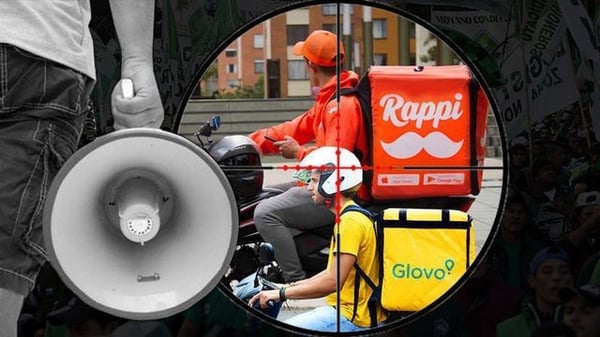You are reading the second part of the interview with Laura Cortés, the first part being about hiring by values and roughly ethical decisions in recruitment.
I don’t think we should be scared of bringing up several articles about the same interview if what the interviewees are telling us has enough value, and this is the case with Laura’s interview. I found two really important themes that I consider should be dealt with with enough time and space.

Thinking inside the box
But let’s get down to the nitty gritty: How many recruitment models do you know? Have you ever been hired directly by the company? Have you ever been hired by an agency that places you in the company? Have you been hired via a headhunter?...
It seems that the conversations in the technology sector regarding hiring people are always focused on two unique models; which are being hired directly by the client or working via a consulting agency.
From there onwards , from our own experience and points of view, we all speak about the pros and cons of one model or the other and, most of all, about the failures of the systems when being hired:
- Maybe they will call mewithout looking at my CV
- Maybe I won’t open my CV because I keep getting called with offers
- Etc.
Even me myself spending time researching and improving practices for people and having experienced the recruitment process on many occasions, I didn’t know about anything beyond certain models that only allow me to see just one side of the reality, just as Laura revealed to me.
Thinking outside the box
If we delve into the world of the recruiter, we start to understand many of those bad practices used on people such as:
- The low salaries that the recruiters normally have
- The time demands from clients to hire an employee
- The little information they have about the offer
- The few ways available for finding CVs that they have access to
This is a variety and accumulation of circumstances that provide an explanation for many of the things that ourselves, as workers, face when looking for work, or even when we are not looking for it.
Knowing all this makes us go beyond our thought process within the box where we reduce the reality to a “they aren’t very good at it” or a “I’m not surprised” when we really put ourselves in the shoes of a recruiter.
The decline of recruitment
Today, unfortunately, this article deals with this third step that, in my opinion, shouldn’t be taken and it goes even further in degrading the recruiter’s conditions, and for that matter, proliferates bad practices when hiring people.
Is it nothing less than Uberisation and the recruitment marketplaces, which Laura tells me about as follows:
>>Listen audio<<
Uberisation and the recruitment marketplaces
Laura tells me about an instability in recruitment work and explains that the current model of getting paid if successful, where you only got paid if, in the end, they took the candidate that you had proposed on for a position, has made it even more difficult.
In these models not only do you get paid when successful (which basically means that you work without knowing whether you will get paid in the end) but there is also a huge amount of competition between other recruiters.
Laura explains that in these models the recruiter works as a “rider”  (like with Glovo or similar business models) where the need to find a certain professional is published  and where there is a competition  between a crowd of recruiters to cover the position.
Egotistically as a company, as a candidate or as a marketplace, we could think that in this way there are more possibilities and the service is able to improve (less so for the recruiter) but throughout this article you will see several points that are against this argument.
>>Listen audio<<
The company using these services
A company that is looking for professionals might think that this type of marketplace is a solution to their recruitment problems and will be cheaper.
It is interesting to hear Laura because besides lowering costs she speaks about reducing search times for the employers but this is at the cost of the recruiters that work on these platforms.
All this, at the end of the day, sounds like ethics on the employer’s behalf, what do you think?
>>Listen audio<<
The candidate that these platforms do business with
At first, it seems like if you are a candidate then none of this should affect you, and if your CV gets passed on more and more, then all the better for you, but here there is something important that should know about as a candidate.
According to what Laura says, what happens with the candidate is that despite your profile being adapted to a job position, it is more difficult for you to get hired because companies don’t just have one optimum candidate profile, but several of them and there are discrimination criteria amongst them as well as the competition that is created with things like “who we like more”, and so it isn’t a considerable advantage for the candidate who also has more competition.
“Recruiting Gate“ and why we need to talk about it
If it hasn’t surprised you or you didn’t know about this recruitment model then I congratulate you, but I can assure you that knowing about it isn’t so common and that, even myself who has been working for a long time with recruitment issues, I came across something that I had absolutely no idea about.
The model doesn’t surprise me because we already know about other types of business that work in this way, but of course, I was unaware of it and according to what Laura tells me, it is normal because it is something which is kept hidden out of self-interest.
Laura and I have internally baptised it as “Recruiting Gate“ in honour of the journalists that unveiled the “Watergate Scandal“; bridging the gap a lot (by the way, if you haven’t seen the film “All the President’s men“ whose photo is next to these words, you need to see it now).
>>Listen audio<<
Using these platforms the other way around
Laura does also talk to me about a more sustainable and useful use of these platforms, both for recruiters and for candidates.
She talks about inverted use where a recruiter can offer job positions that mould to the candidates they have and that have not been matched to other procedures because they are looking for something more specific, etc.
It doesn’t seem then that all the business models of these platforms mean instability for recruitment, but it is true that the use of the “rider” type is damaging and that is just what we are seeing.
>>Listen audio<<
The dangers of making recruitment democratic
Making the production methods used for recruitment democratic creates the possibility that many people could be recruiters and this seems to be a step forward and Laura tells us that, however, it is  creating an effect that I would call “Non-professional recruitment” where bad practice is multiplied for candidates.
Laura tells me how now it is very easy to become a recruiter and how it has been the solution for many different people with very different profiles, where the number of recruiters has increased a lot with the economic crisis in Spain.
>>Listen audio<<
The future of recruitment as a business
In view of the outlook, I ask Laura about what all this will come to and her answer is “Differentiation", listen to her because it is very interesting and we already know about a business model that is emerging in that regard and it seems to be being well received by the candidates.
>>Listen audio<<
“There are sectors that create scandals out of much less”
This phrase literally came up in the conversation with Laura and I wholeheartedly agree with her, and now allow me to speak from my personal point of view, where I think, we have to speak about attitudes and privileges.
The recruiters are the baddies in the films, the ones who create bad procedures, the ones hiding information from me, the ones calling me all day long,... and if we don’t look outside of our box within the privileges that often means we find ourselves in a privileged sector where there is the “problem” of putting the phone down on somebody approaching you “again” for a job position.
I think that what is good for some is good for others; several people from the IT sector have said so on many occasions (here I have to name a great professional that has been talking to you about this for a while and it is Irene Morgado with her study entitled “El feliz developer” (The happy developer) and I think, like Laura, that there are things that need to be brought to light and not normalised because it is negative for everybody.
The “rider” competition mechanics between recruiters when submitting candidates for a job position doesn’t only perpetuate and increase the bad hiring practices that the candidates suffer, but it also unsustainably puts the work of many people under pressure towards intolerable limits for a lot of them.
A part of the IT sector, and usually the most privileged, has enough force to help to dismantle this type of practice, it has enough power to ensure that their data as professionals is not distributed at the cost of instability for other colleagues, normally those who aren’t as privileged in the sector; I think that knowing this and as candidates, we should demand to know where our data is taken from for an application, or what the process has been like during it.
If from our ethical values we each value what is done or not done with our profiles during hiring procedures, I think that we can reverse and improve a system, that on the contrary will become a perverse system that we are indirectly feeding.
Now that you know that these practices exist, I encourage you to do some further research and take a stand if you think it is necessary, and of course, always do so from your own point of view.
I personally want to thank Laura for her bravery in shedding light on this topic, it is a brave thing to do, and for her commitment to improving dignified work for everybody.
*Authors’s note: this interview and article were made before the death of a Glovo’s worker who died in the development of his work activity. We express our condolences to the group of companions “Riders” and we don’t pretend at any moment to equalize this situation to the one explained in this article; unfortunately, even in precarization there are privilege levels.




